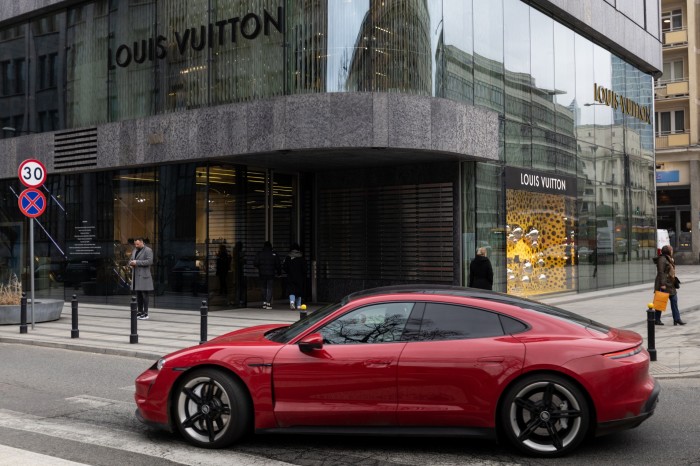[ad_1]
From private schools to cosmetic surgery clinics, restaurants and upmarket estate agents, Polish businesses catering to the well-heeled are adapting to a new influx of customers: wealthy Ukrainians fleeing Russia’s war.
While a majority of refugees were forced to escape their country with few possessions, a smaller group of relatively affluent Ukrainians arrived in their own cars and have provided an unexpected boost to upmarket businesses amid an economic slowdown.
Tom McGrath, head teacher of the private British primary school in Wilanów, a leafy Warsaw suburb that is home to a large expatriate community, said his school was beginning construction work to triple the footprint of its buildings, partly thanks to a rise in Ukrainian students.
“The international school market has grown and the Ukrainians are a strong factor in that,” said McGrath, whose school charges the equivalent of $15,000 a year in tuition fees. “The growth in Ukrainian pupil numbers has positively influenced” the decision to expand, he said.

Poland has been the EU’s main gateway for Ukrainians escaping Moscow’s aggression. About 1.5mn Ukrainians registered for temporary protection in Poland last year, while millions more travelled via Poland to other countries.
While most crossed the Polish border in dire conditions, “migration is always selective and those who arrived here first arrived in their own cars, so they were relatively well positioned in material terms”, said Paweł Kaczmarczyk, head of the Centre of Migration Research at the University of Warsaw.
Businesses catering to middle-class and wealthy individuals said they have been hiring Ukrainian-speaking staff, while Ukrainian spending has helped to insulate them from the economic effects of inflation.
Anna Kuznetsova, founder of the Hairmitage cosmetic surgery clinic in Warsaw, recently hired a Ukrainian doctor who was now “fully booked” performing hair treatments and other procedures, she said. Ukrainians represent between 10 and 20 per cent of her Warsaw customers.
Poland was already home to around 1.3mn Ukrainians before Russian president Vladimir Putin launched his full-scale invasion of their home country last year. But the war has cut off access to Ukrainian services, accentuating the shift to Polish businesses.
“Ukrainians did not come to us before because such a medical service was much cheaper in Ukraine, but now that they are in Poland they have no choice,” said Kuznetsova.
Poland won plaudits for its warm embrace of Ukrainian refugees last spring, when a grassroots army of Polish volunteers helped ease their arrival. More recently, Polish authorities have cut subsidies for Ukrainians and some refugee fatigue has set in. But business owners continue to welcome the extra customers as they wrestle with the effects of inflation running at 17 per cent.
Despite the economic slowdown, Polish real estate prices have kept rising, boosted by Ukrainians looking for homes.
“Many Ukrainians have come with cash and they can certainly buy expensive property,” said Ukrainian real estate agent Yuliia Antoniuk, who moved from Kyiv to Warsaw a year ago with her son.
“I know many wealthy Ukrainians who went last summer to look at sunnier places in Italy, Spain or Monaco, but most have children and 70 per cent then came back to Warsaw because it’s easier here for schools,” she said.
Mateusz Walewski, chief economist at BGK bank, said that tracking Ukrainian purchases was difficult, “but if you look at how our domestic demand for mortgages has recently fallen, we should have also seen a fall in housing prices — but this didn’t happen and that is partially due to buying by Ukrainians”.
Typical consumption by Ukrainian refugees is far lower than that of Polish households, at an estimated 39 per cent of the average Polish figure, according to a February study by bank Santander Poland.
This partly reflects high numbers of children among fleeing Ukrainians, but Santander also noted that “it is difficult to imagine that a war refugee, who has often left the lion’s share of his belongings in his home country, will be able to consume as much as the average citizen of the host country”.

However, that has not stopped a series of Ukrainian businesses from opening stores in Warsaw to sell croissants like those available in Lviv, or offer beauty treatments with Ukrainian staff, many of whom also escaped the war.
Ukrainian-owned Leo Beauty Club opened two venues in Warsaw last year aimed at Ukrainians, who now represent 70 per cent of its Warsaw clients. Demand is so strong that “you have to sign up at least a month in advance”, said receptionist Julia Rantsia.
Upmarket restaurants and bars in Warsaw have hired Ukrainian staff to make things easier and even write down bookings in Ukraine’s Cyrillic alphabet. “There are days when half of the customers are Ukrainians,” said bartender Igor Dobrinov of restaurant Flaming.
At an upmarket shopping mall in central Warsaw, oversized cars with tinted glass queue for a car wash that charges 580 zlotys ($130) to clean an SUV, using premium leather treatment products to polish the seats.
Ukrainians now account for 30 per cent of its clientele, said sales agent Agnieszka Rudaś. “It’s not as if we would have had to close down without them, but Ukrainians are now clearly important for us.”
[ad_2]
Source link


